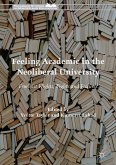The handbook explores recent developments in higher-education systems and policy as well as the everyday experiences of students and staff and ongoing problems of inequality and diversity within universities. In doing so, the chapters address a number of current issues concerning the legitimacy of higher-educational credentials, from the continuing debate regarding traditional pedagogies and the role of universities in social class reproduction to more recent concerns about standards in mass systems.
Collectively, this handbook demonstrates that the sociology of higher education has the potential to play a leadership role in improving the myriad higher-education systems around the world that are now part of an interrelated set of subsystems, replete with both persistent problems and promising prospects. This book is therefore necessary reading for a variety of stakeholders within academia as well as professionals and policy-makers interested in understanding higher education and the acute challenges it faces.
Dieser Download kann aus rechtlichen Gründen nur mit Rechnungsadresse in A, B, BG, CY, CZ, D, DK, EW, E, FIN, F, GR, HR, H, IRL, I, LT, L, LR, M, NL, PL, P, R, S, SLO, SK ausgeliefert werden.
Stephen J. Ball, Emeritus Professor of Sociology of Education, University College London, UK
'This volume offers a foundational contribution to the field. The second edition reflects an impressive array of topics, thereby elucidating significant issues, debates, and transformations underway in higher education. The insights and information conveyed in these thoughtful chapters will be valuable for those who study higher education as well as participants in the enterprise writ large.'
Patricia J. Gumport, Professor of Education, Directorof the Stanford Institute for Higher Education Research and the founding Vice Provost for Graduate Education and Postdoctoral Affairs at Stanford University, USA
'The second edition of the Routledge Handbook of the Sociology of Higher Education provides a valuable and authoritative account of scholarship in the sociology of higher education today. Making clear the developments and trends in higher education, the volume situates them within established ways of conceptualising and understanding the field, and will make a valuable reference point for scholars of higher education and those who work in the sector.'
Professor Clare Brooks, Pro-Director for Education at the UCL Institute of Education, UK









